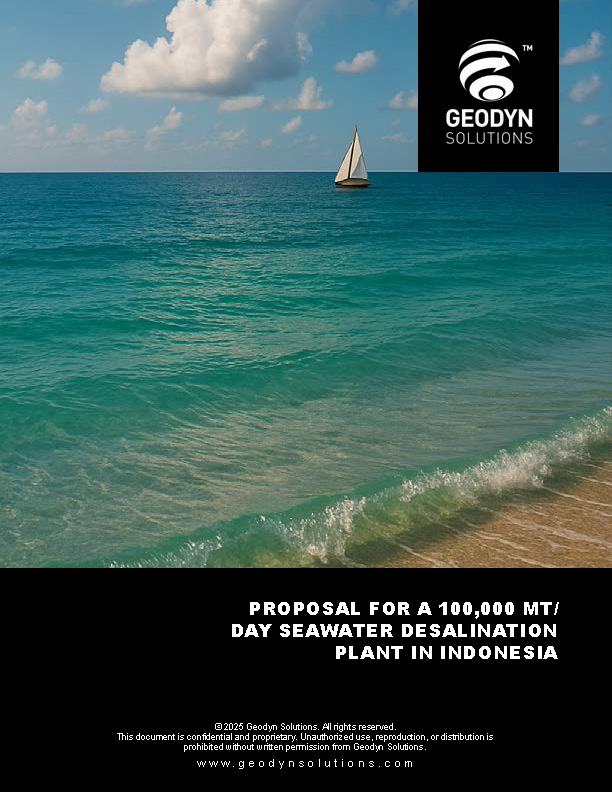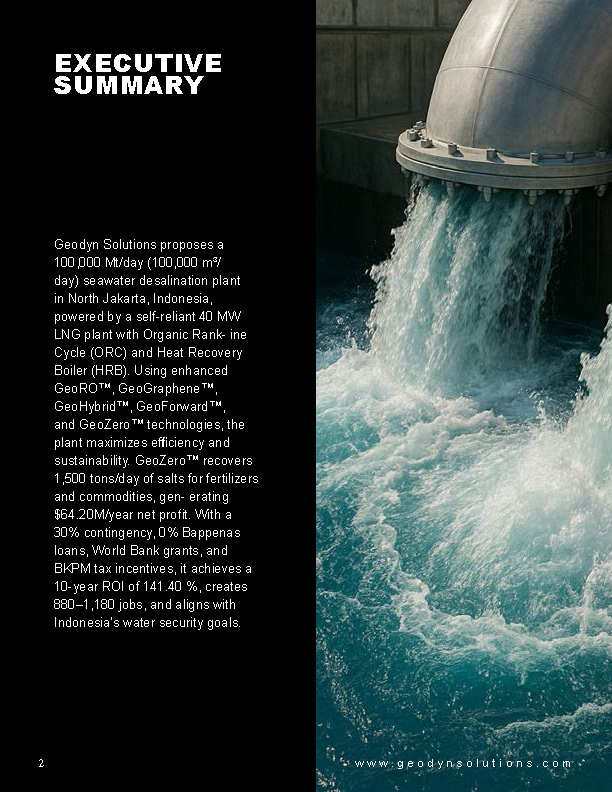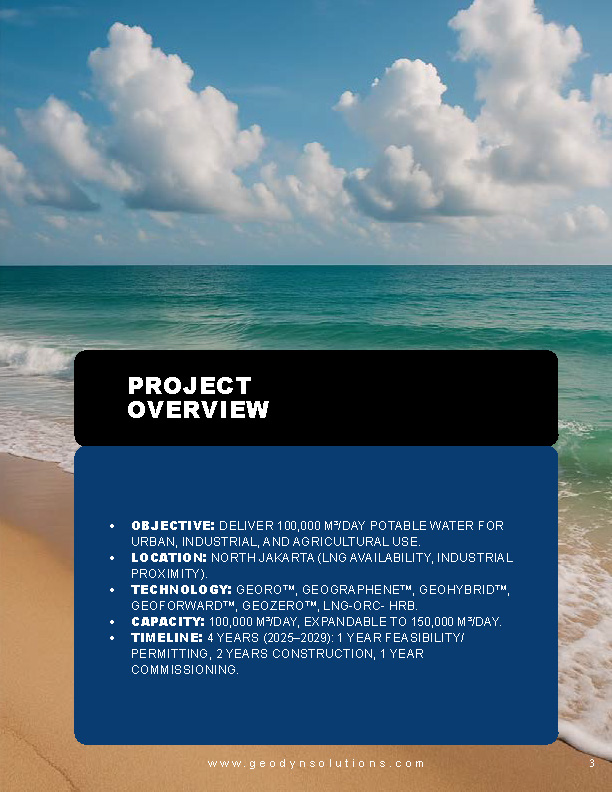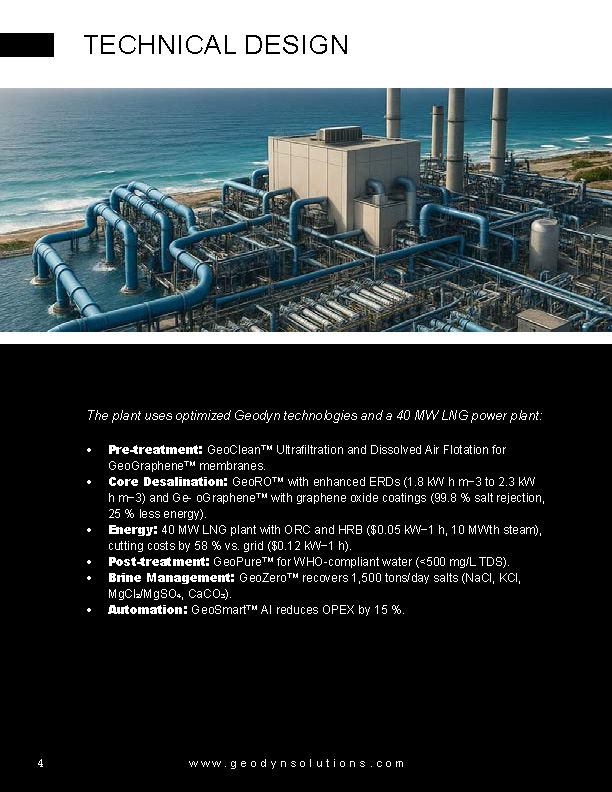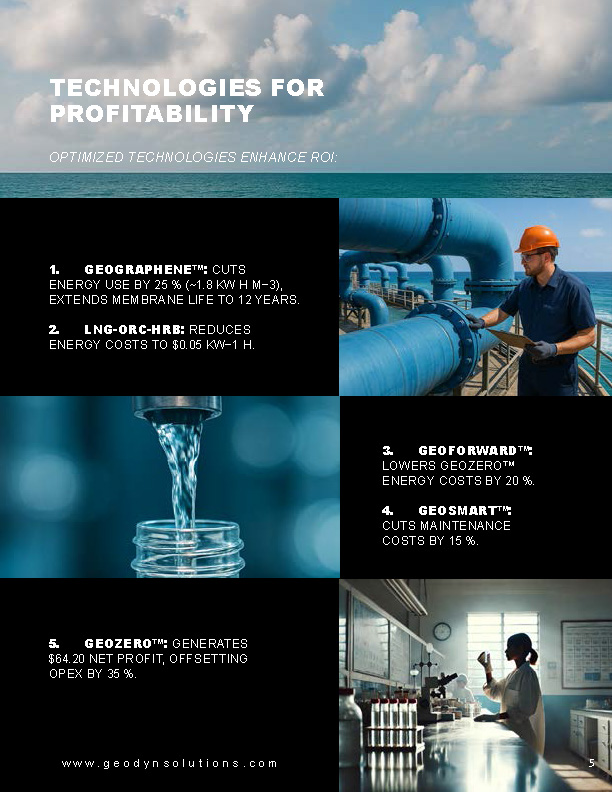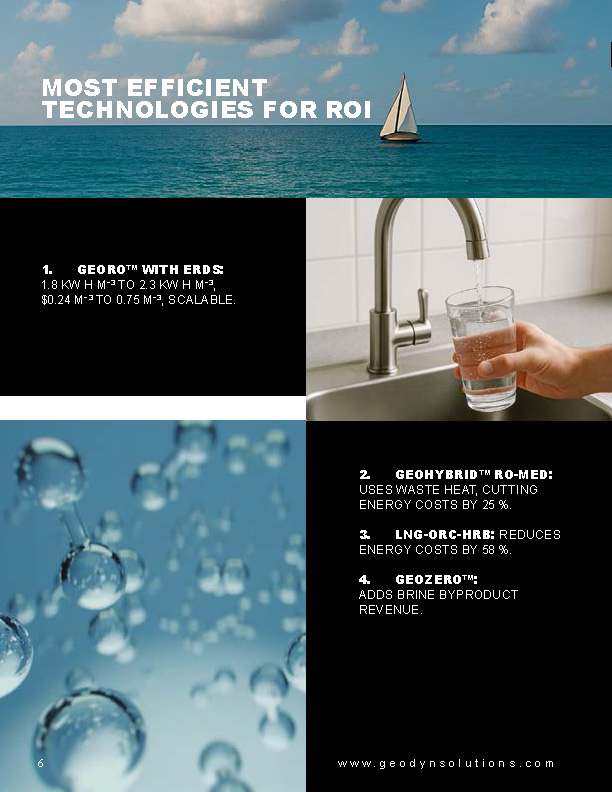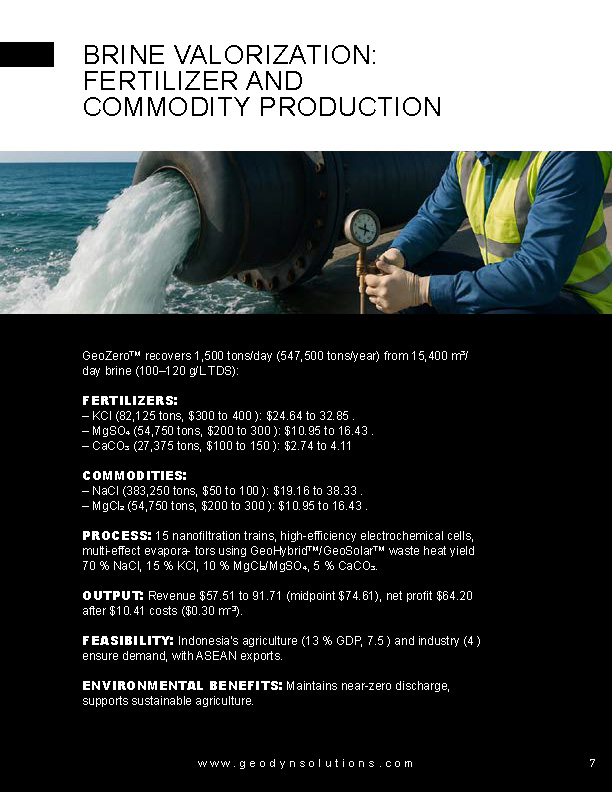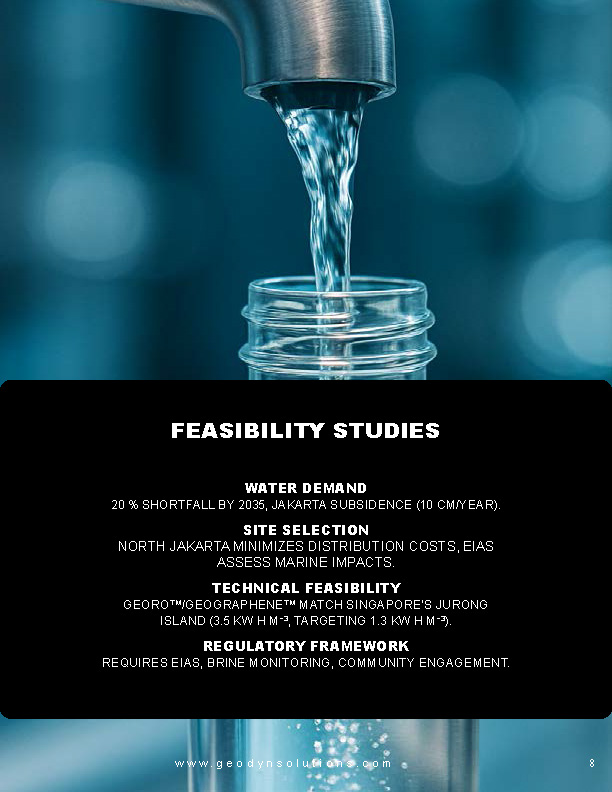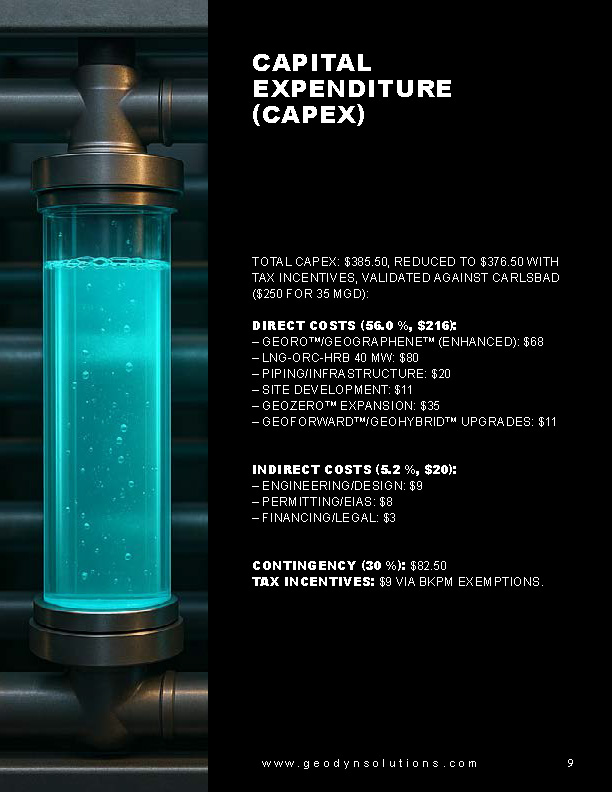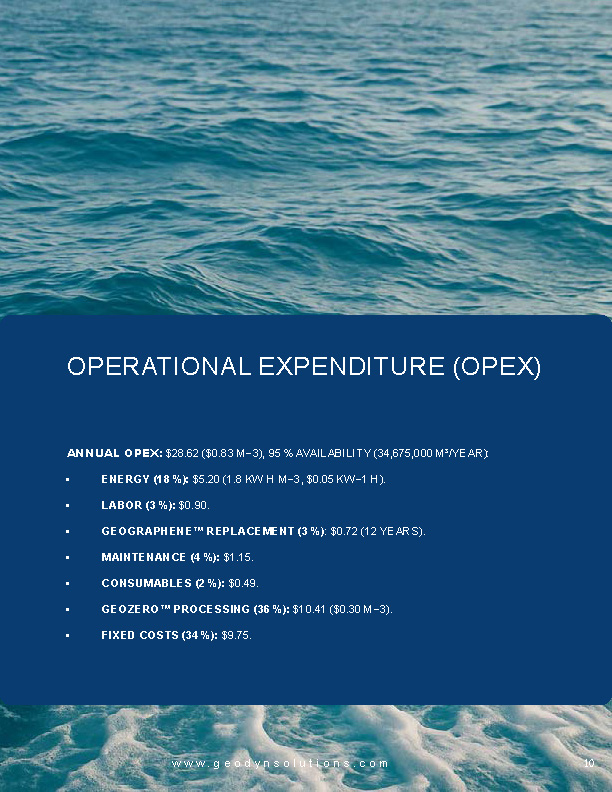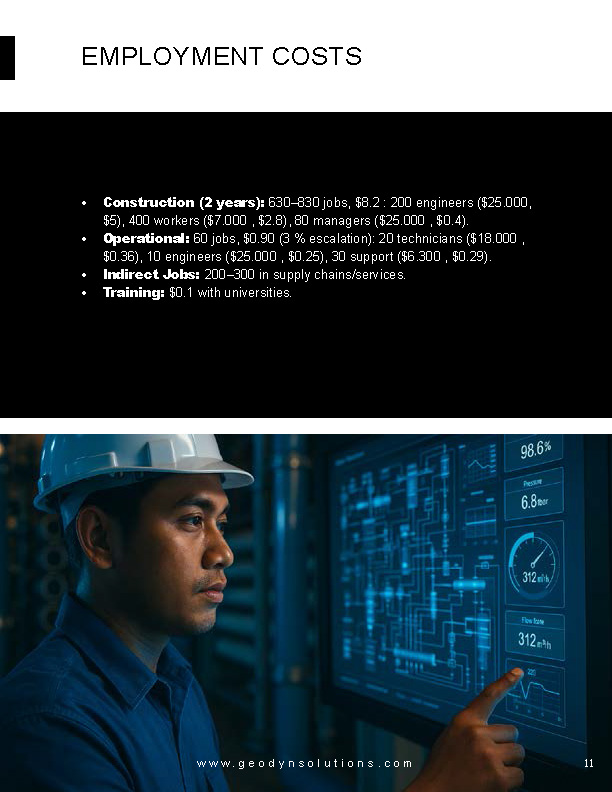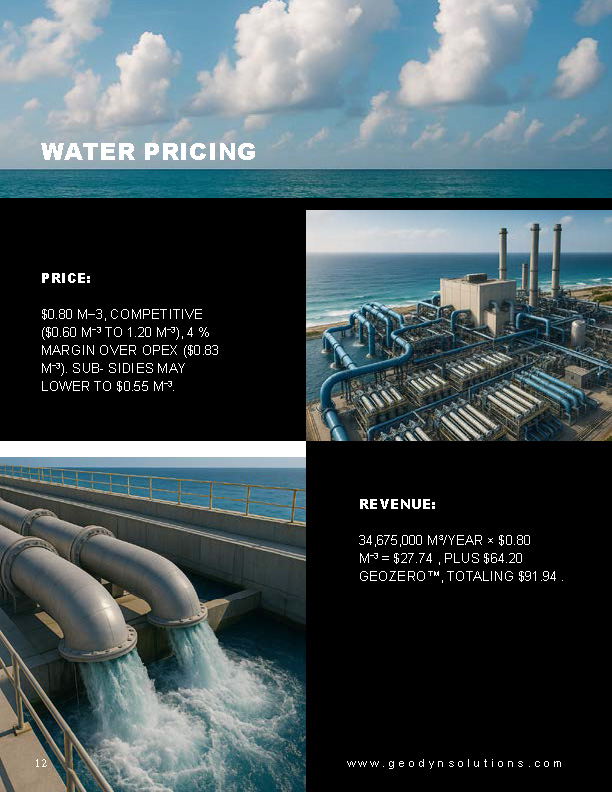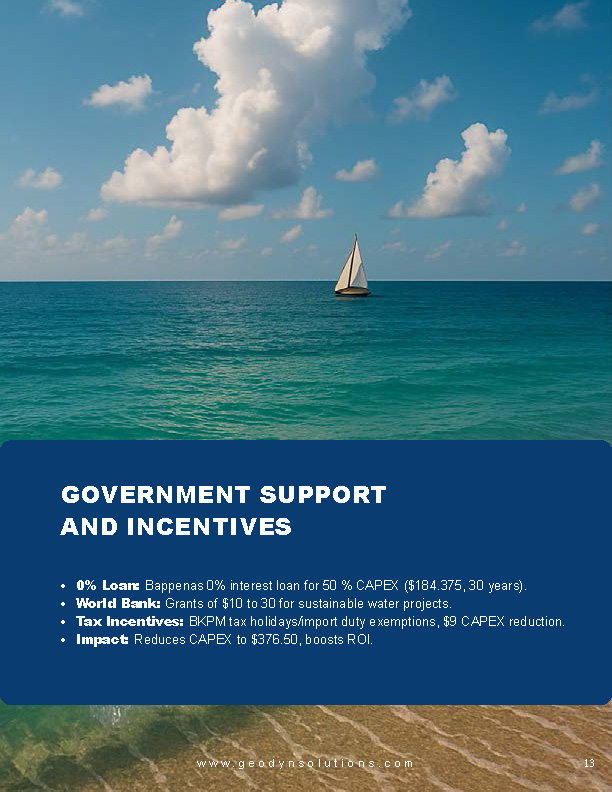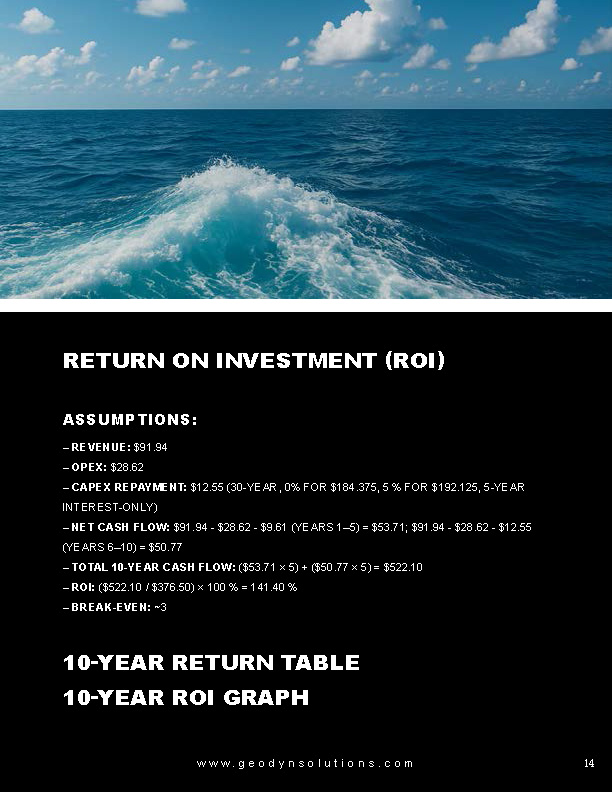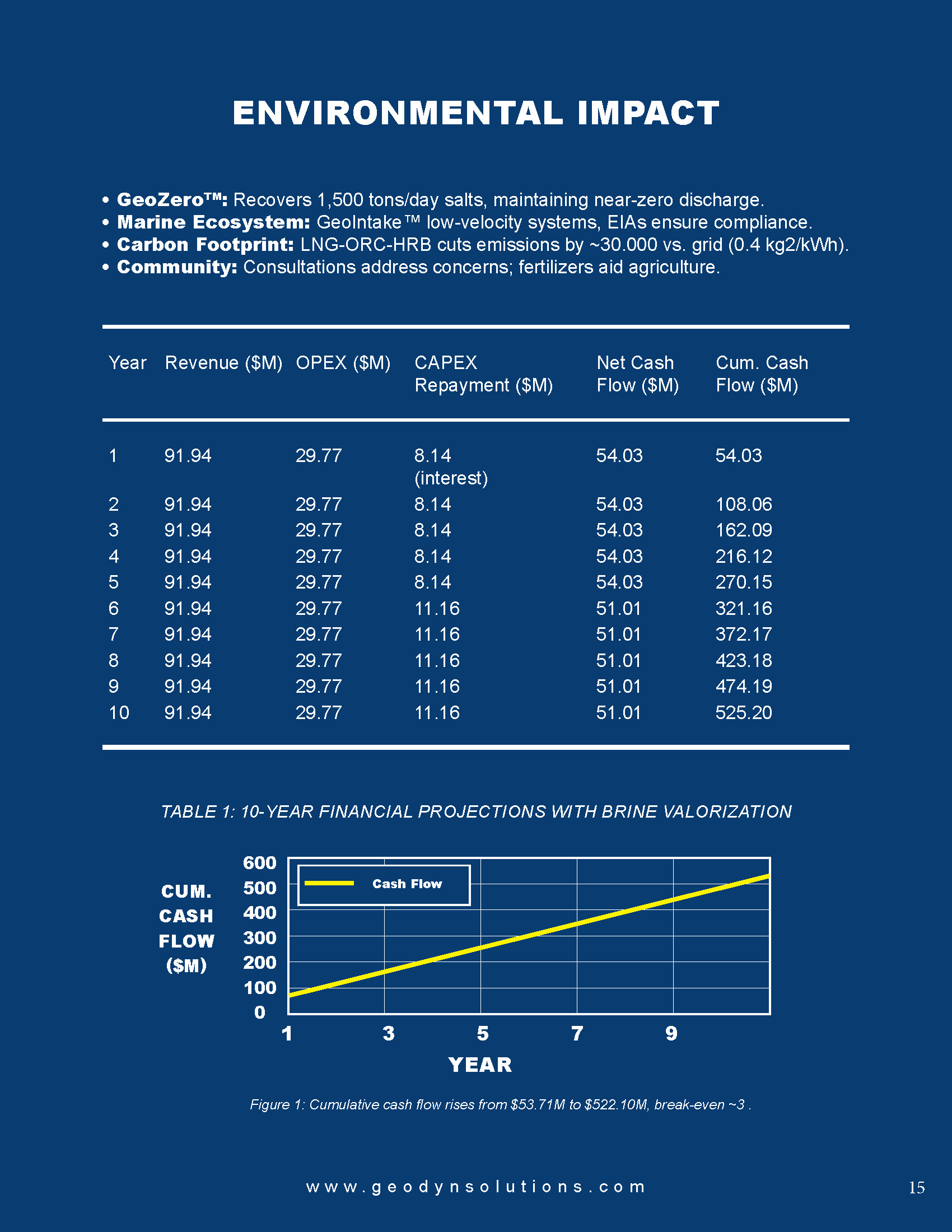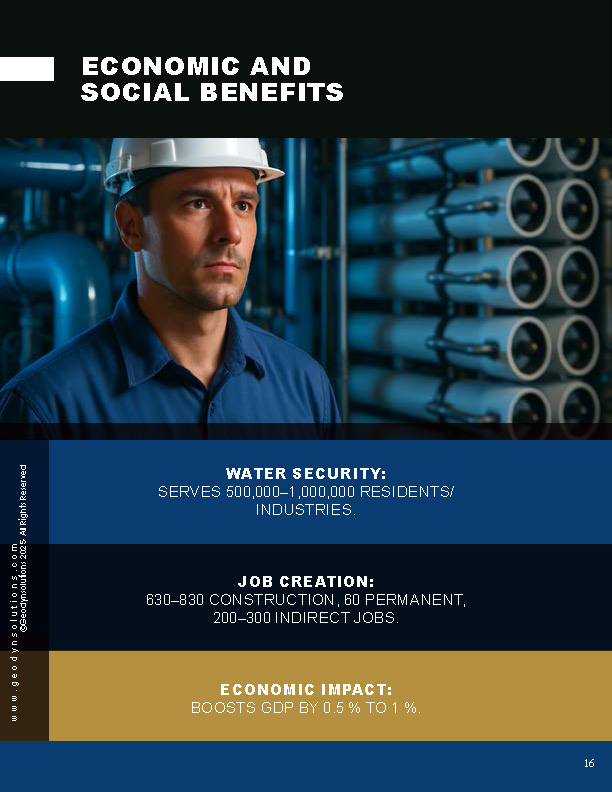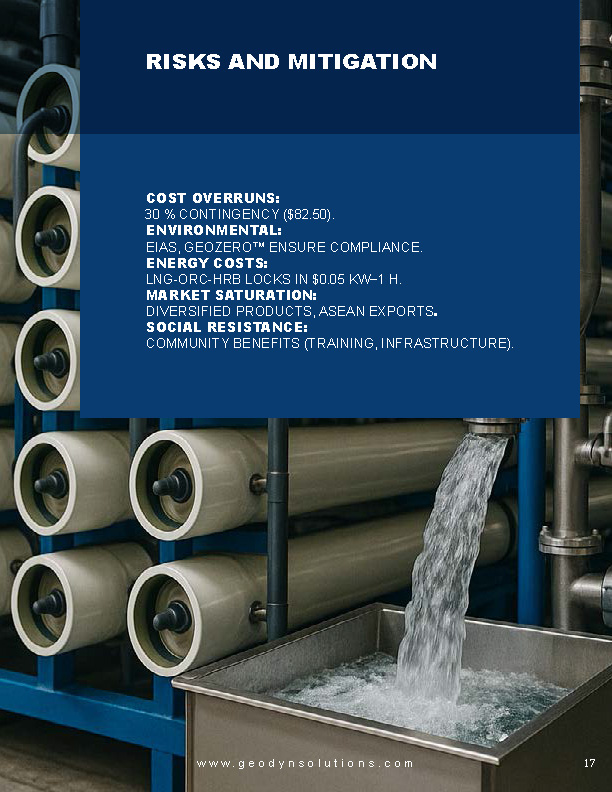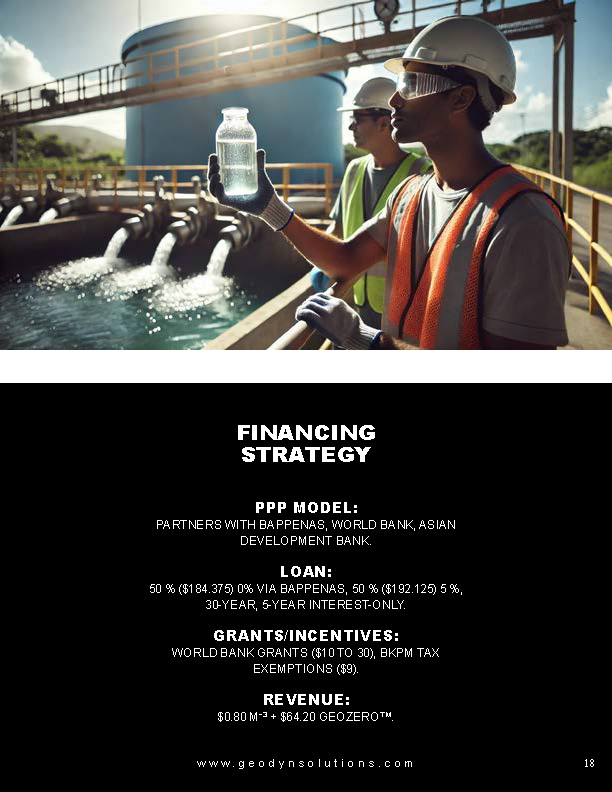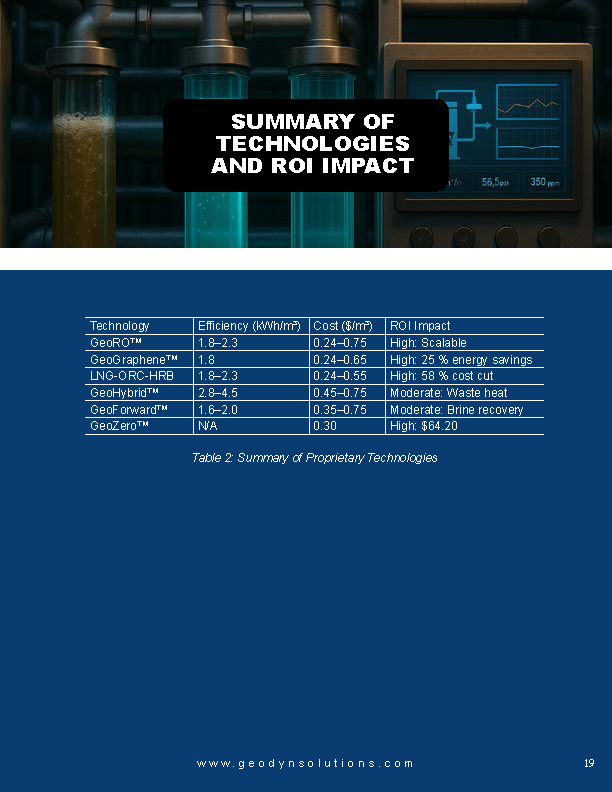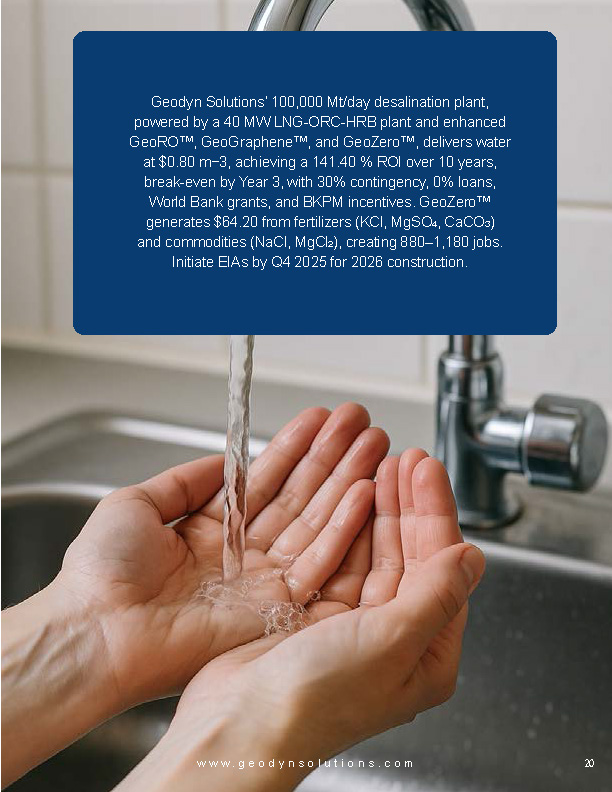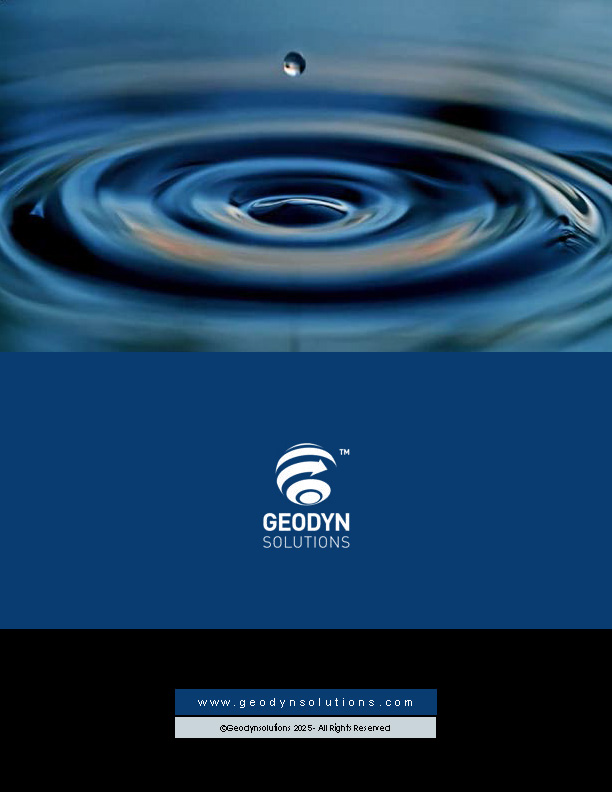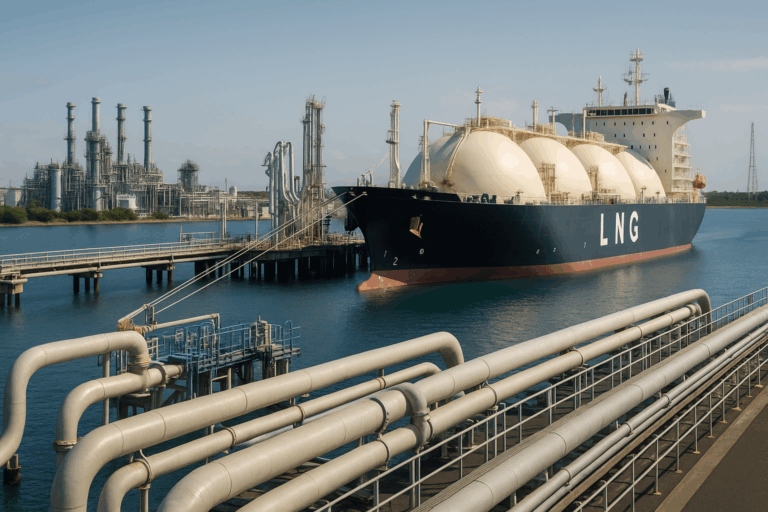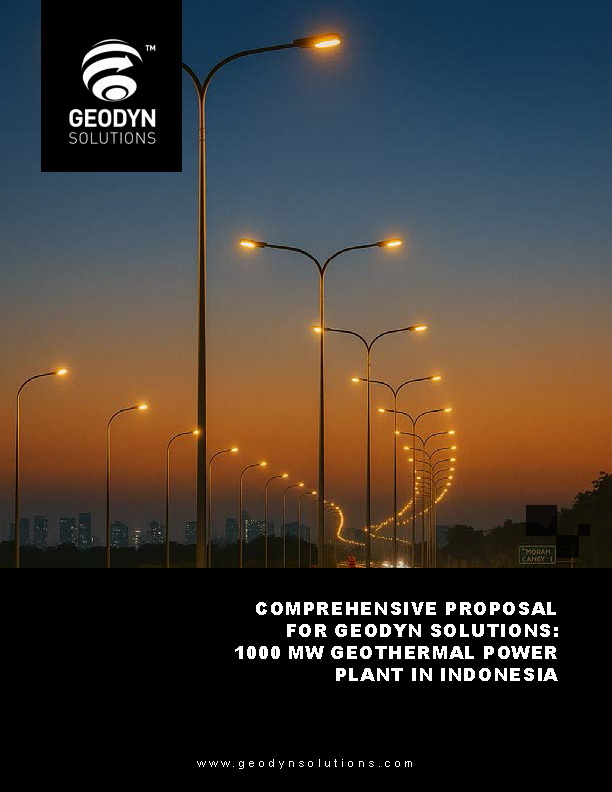Proposal for a 100,000 Mt-day Seawater Desalination - LNG
Executive Summary
Geodyn Solutions proposes a 100,000 Mt/day (100,000 m³/day) seawater desalination plant in North Jakarta, Indonesia, powered by a self-reliant 40 MW LNG plant with Organic Rank- ine Cycle (ORC) and Heat Recovery Boiler (HRB). Using enhanced GeoRO™, GeoGraphene™, GeoHybrid™, GeoForward™, and GeoZero™ technologies, the plant maximizes efficiency and sustainability. GeoZero™ recovers 1,500 tons/day of salts for fertilizers and commodities, gen- erating $64.20M/year net profit. With a 30% contingency, 0% Bappenas loans, World Bank grants, and BKPM tax incentives, it achieves a 10-year ROI of 141.40 %, creates 880–1,180 jobs, and aligns with Indonesia’s water security goals.
1 Project Overview
- Objective: Deliver 100,000 m³/day potable water for urban, industrial, and agricultural
- Location: North Jakarta (LNG availability, industrial proximity).
- Technology: GeoRO™, GeoGraphene™, GeoHybrid™, GeoForward™, GeoZero™, LNG-ORC-
- Capacity: 100,000 m³/day, expandable to 150,000 m³/day.
- Timeline: 4 years (2025–2029): 1 year feasibility/permitting, 2 years construction, 1 year
2 Technical Design
The plant uses optimized Geodyn technologies and a 40 MW LNG power plant:
- Pre-treatment: GeoClean™ Ultrafiltration and Dissolved Air Flotation for GeoGraphene™ membr
- Core Desalination: GeoRO™ with enhanced ERDs (1.8 kW h m−3 to 2.3 kW h m−3) and Ge- oGraphene™ with graphene oxide coatings (99.8 % salt rejection, 25 % less energy).
- Energy: 40 MW LNG plant with ORC and HRB ($0.05 kW−1 h, 10 MWth steam), cutting costs by 58 % grid ($0.12 kW−1 h).
- Post-treatment: GeoPure™ for WHO-compliant water (<500 mg/L TDS).
- Brine Management: GeoZero™ recovers 1,500 tons/day salts (NaCl, KCl, MgCl₂/MgSO₄, CaCO₃).
- Automation: GeoSmart™ AI reduces OPEX by 15 %.
3 Technologies for Profitability
Optimized technologies enhance ROI:
- GeoGraphene™: Cuts energy use by 25 % (∼1.8 kW h m−3), extends membrane life to 12
- LNG-ORC-HRB: Reduces energy costs to $0.05 kW−1
- GeoForward™: Lowers GeoZero™ energy costs by 20 %.
- GeoSmart™: Cuts maintenance costs by 15 %.
- GeoZero™: Generates $64.20 net profit, offsetting OPEX by 35 %.
4 Most Efficient Technologies for ROI
- GeoRO™ with ERDs: 1.8 kW h m−3 to 2.3 kW h m−3, $0.24 m−3 to 0.75 m−3,
- GeoHybrid™ RO-MED: Uses LNG-HRB steam, cutting energy costs by 25 %.
- LNG-ORC-HRB: Reduces energy costs by 58 %.
- GeoZero™: Adds brine byproduct
5 Brine Valorization: Fertilizer and Commodity Production
GeoZero™ recovers 1,500 tons/day (547,500 tons/year) from 15,400 m³/day brine (100–120 g/L TDS):
• Fertilizers:
– KCl (82,125 tons, $300 to 400 ): $24.64 to 32.85 .
– MgSO₄ (54,750 tons, $200 to 300 ): $10.95 to 16.43 .
– CaCO₃ (27,375 tons, $100 to 150 ): $2.74 to 4.11 .
• Commodities:
– NaCl (383,250 tons, $50 to 100 ): $19.16 to 38.33 .
– MgCl₂ (54,750 tons, $200 to 300 ): $10.95 to 16.43 .
- Process: 15 nanofiltration trains, high-efficiency electrochemical cells, multi-effect evapo- rators using GeoHybrid™/LNG-HRB steam yield 70 % NaCl, 15 % KCl, 10 % MgCl₂/MgSO₄, 5 % CaCO₃.
- Output: Revenue $57.51 to 91.71 (midpoint $74.61), net profit $64.20 after $10.41 costs ($0.30 m−3).
- Feasibility: Indonesia’s agriculture (13 % GDP, 7.5 ) and industry (4 ) ensure demand, with ASEAN
- Environmental Benefits: Maintains near-zero discharge, supports sustainable
6 Feasibility Studies
- Water Demand: 20 % shortfall by 2035, Jakarta subsidence (10 cm/year).
- Site Selection: North Jakarta leverages LNG access, EIAs assess marine
- Technical Feasibility: GeoRO™/GeoGraphene™ match Singapore’s Jurong Island (3.5 kW h m−3, targeting 1.3 kW h m−3).
- Regulatory Framework: Requires EIAs, brine monitoring, community
7 Capital Expenditure (CAPEX)
Total CAPEX: $385.50, reduced to $376.50 with tax incentives, validated against Carlsbad ($250 for 35 MGD):
- Direct Costs (56.0 %, $216):
- GeoRO™/GeoGraphene™ (enhanced): $68
- LNG-ORC-HRB 40 MW: $80
- Piping/infrastructure: $20
- Site development: $11
- GeoZero™ expansion: $35
- GeoForward™/GeoHybrid™ upgrades: $11
- Indirect Costs (5.2 %, $20):
- Engineering/design: $9
- Permitting/EIAs: $8
- Financing/legal: $3
- Contingency (30 %): $82.50
- Tax Incentives: $9 via BKPM
8 Operational Expenditure (OPEX)
Annual OPEX: $28.62 ($0.83 m−3), 95 % availability (34,675,000 m³/year):
- Energy (18 %): $5.20 (1.8 kW h m−3, $0.05 kW−1 h).
- Labor (3 %): $0.90.
- GeoGraphene™ Replacement (3 %): $0.72 (12 years).
- Maintenance (4 %): $1.
- Consumables (2 %): $0.
- GeoZero™ Processing (36 %): $10.41 ($0.30 m−3).
- Fixed Costs (34 %): $9.75.
9 Employment Costs
- Construction (2 years): 630–830 jobs, $8.2 : 200 engineers ($25.000 , $5), 400 workers ($7.000 ,
$2.8), 80 managers ($25.000 , $0.4).
- Operational: 60 jobs, $0.90 (3 % escalation): 20 technicians ($18.000 , $0.36), 10 engineers ($25.000 , $0.25), 30 support ($6.300 , $0.29).
- Indirect Jobs: 200–300 in supply chains/services.
- Training: $0.1 with
10 Water Pricing
- Price: $0.80 m−3, competitive ($0.60 m−3 to 1.20 m−3), 4 % margin over OPEX ($0.83 m−3). Sub- sidies may lower to $0.55 m−3.
- Revenue: 34,675,000 m³/year × $0.80 m−3 = $27.74 , plus $64.20 GeoZero™, totaling $91.94 .
11 Government Support and Incentives
- 0% Loan: Bappenas 0% interest loan for 50 % CAPEX ($184.375, 30 years).
- World Bank: Grants of $10 to 30 for sustainable water
- Tax Incentives: BKPM tax holidays/import duty exemptions, $9 CAPEX
- Impact: Reduces CAPEX to $376.50, boosts R
12 Return on Investment (ROI)
• Assumptions:
- Revenue: $91.94
– OPEX: $28.62
- CAPEX repayment: $12.55 (30-year, 0% for $184.375, 5 % for $192.125, 5-year interest-only)
– Net Cash Flow: $91.94 – $28.62 – $9.61 (Years 1–5) = $53.71; $91.94 – $28.62 – $12.55 (Years 6–10)
= $50.77
– Total 10-Year Cash Flow: ($53.71 × 5) + ($50.77 × 5) = $522.10
– ROI: ($522.10 / $376.50) × 100 % = 141.40 %
- Break-even: ∼3
13 10-Year Return Table
- 10-Year ROI Graph
- Environmental Impact
- GeoZero™: Recovers 1,500 tons/day salts, maintaining near-zero
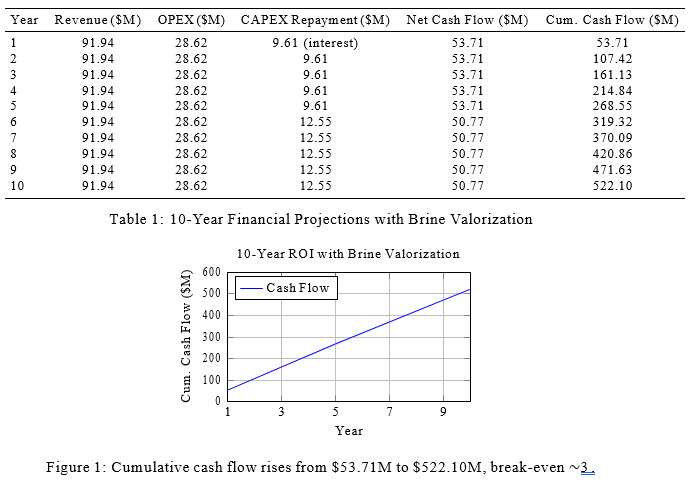
- Marine Ecosystem: GeoIntake™ low-velocity systems, EIAs ensure
- Carbon Footprint: LNG-ORC-HRB cuts emissions by ∼30.000 grid (0.4 kg2/kWh).
- Community: Consultations address concerns; fertilizers aid
1 Economic and Social Benefits
- Water Security: Serves 500,000–1,000,000 residents/industries.
- Job Creation: 630–830 construction, 60 permanent, 200–300 indirect
- Economic Impact: Boosts GDP by 0.5 % to 1 %.
2 Risks and Mitigation
- Cost Overruns: 30 % contingency ($82.50).
- Environmental: EIAs, GeoZero™ ensure
- Energy Costs: LNG-ORC-HRB locks in $0.05 kW−1
- Market Saturation: Diversified products, ASEAN
- Social Resistance: Community benefits (training, infrastructure).
3 Financing Strategy
- PPP Model: Partners with Bappenas, World Bank, Asian Development
- Loan: 50 % ($184.375) 0% via Bappenas, 50 % ($192.125) 5 %, 30-year, 5-year interest-only.
- Grants/Incentives: World Bank grants ($10 to 30), BKPM tax exemptions ($9).
- Revenue: $0.80 m−3 + $64.20 GeoZero™.
4 Summary of Technologies and ROI Impact

1 Conclusion
Geodyn Solutions’ 100,000 Mt/day desalination plant, powered by a 40 MW LNG-ORC-HRB plant and enhanced GeoRO™, GeoGraphene™, and GeoZero™, delivers water at $0.80 m−3, achieving a 141.40 % ROI over 10 years, break-even by Year 3, with 30% contingency, 0% loans, World Bank grants, and BKPM incentives. GeoZero™ generates $64.20 from fertilizers (KCl, MgSO₄, CaCO₃) and commodities (NaCl, MgCl₂), creating 880–1,180 jobs. Initiate EIAs by Q4 2025 for 2026 construction.
2 Contact
Geodyn Solutions
Email: info@geodynsolutions.com
